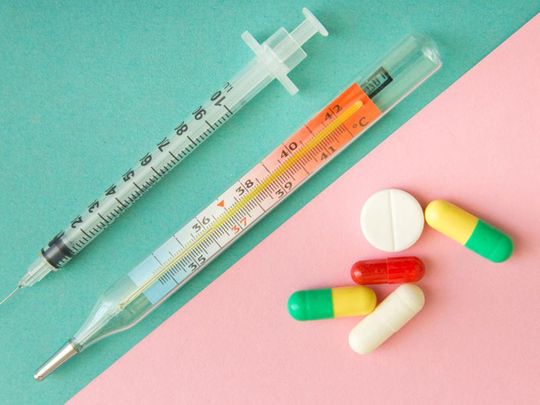
From drug-free options with minimal intervention to epidurals, the full gambit is available to birthing mothers here in the UAE, but before diving in, it’s best to be informed about the effects of each...
Pethidine
This is a drug offered here which can help you relax and minimise the impact of contractions, easing labour pains for many. Injected into the thigh or buttock it takes around 20 minutes to kick in with the effects lasting between two and four hours. However it is worth noting that this powerful morphine-like drug not only makes women feel very out of it, but does pass through the placenta and can cause babies to be very drowsy, possibly impacting on early breastfeeding success.
Epidural
Another option for pain relief is an epidural, a local anaesthetic injected into the spine that numbs the nerves that carry the pain impulses from the birth canal to the brain. This can be particularly helpful in long and intense labours, numbing the lower half of the body. Potential benefits of an epidural are that it can allow you to rest, relax, get focused, and give you the strength to move forward in your birth experience. However some reported down sides can include making pushing more difficult, potentially resulting in the need for more medications or interventions.
Gas and air
One of the most popular and non-invasive methods of pain relief during labour is gas and air, a combination of oxygen and nitrous oxide gas. Mamas simply breathe in the mixture as needed, with the added benefit of being able to hold and control the mouthpiece yourself, allowing you to set the rhythm of the relief as each contraction comes. The drawback for some may be that it often just takes the edge off, rather than blocking out contraction sensation.
Water birth
Water Birth was first made possible in Dubai in 2013 and many of the major hospitals now offer it as an option. Birthing in specially heated pools has been found to have major benefits to labouring women, including boosting energy levels by helping to literally take the weight off for floating mamas. According to the recent studies, water birth reduces labour pain by up to 70 per cent, which is not to be scoffed at. However most providers won’t allow you to take any other form of pain relief, except gas and air, during a water birth to ensure maximum safety for mother and baby. Although Water Birth was banned for some time during the firt year of the pandemic, it has been reintroduced by several hospitals - check with your chosen hospital whether their policies have changed, and if all doctors will do it.
TENS machine
Transcutaneous electrical nerve stimulation may sound like a mouthful but it could be just what you need during delivery. These amazing little machines send safe currents of electricity to electrodes placed on your back to offer concentrated pain relief, which is ideal during the early phases of labour. Some hospitals will have TENS machines available, but it’s a good idea to check in advance in case you want to bring your own.








